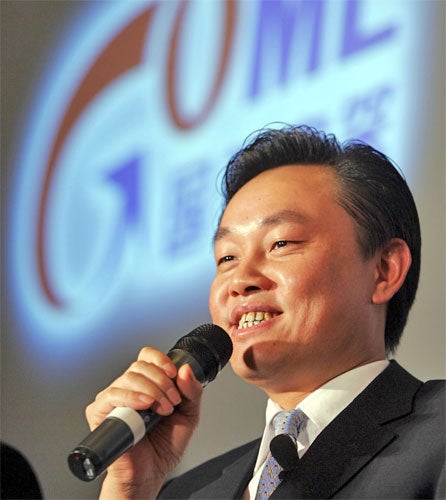China's 'king of fridges' gets 14 years for corruption

Your support helps us to tell the story
From reproductive rights to climate change to Big Tech, The Independent is on the ground when the story is developing. Whether it's investigating the financials of Elon Musk's pro-Trump PAC or producing our latest documentary, 'The A Word', which shines a light on the American women fighting for reproductive rights, we know how important it is to parse out the facts from the messaging.
At such a critical moment in US history, we need reporters on the ground. Your donation allows us to keep sending journalists to speak to both sides of the story.
The Independent is trusted by Americans across the entire political spectrum. And unlike many other quality news outlets, we choose not to lock Americans out of our reporting and analysis with paywalls. We believe quality journalism should be available to everyone, paid for by those who can afford it.
Your support makes all the difference.He was born into poverty and dropped out of school. But Huang Guangyu built a business out of selling domestic appliances, becoming the richest man in China with a fortune worth £4.4bn. Yesterday, after one of the biggest corruption trials the country has seen, Mr Huang's career ended in a jail cell where he will spend the next 14 years.
China hopes the tycoon's punishment will send a clear warning to entrepreneurs and to foreign investors: that Beijing is taking a tough line on white-collar crime. The problem remains that despite huge advances, the rules for doing business in China are still being written.
The country has more than its fair share of cautionary tales for the would-be wealthy. Nearly 30 billionaires who have appeared on the annual Hurun rich list have been charged with bribery or are at the centre of a police investigation, while 19 of the 1,330 business tycoons listed in the past 10 years are either in jail or awaiting sentencing on bribery charges.
Mr Huang's career trajectory from rags to model entrepreneur began in southern Guangdong when as a teenager he got involved in the rag trade. Aged 17 he left his home town in Shantou to try his luck in Beijing. There he set up a roadside stall selling radios and other roadside gadgets that he bought from factories in Shantou. His energy and ingenuity coincided with an unprecedented boom in demand for fridges, TVs and washing machines in a newly consumerist China.
He aggressively delayed payments to suppliers, earning him the nickname the "price butcher", cutting margins to the quick, and soon had a handful of stores, which rapidly expanded. Gome Group now has more than 1,100 stores in 200 cities, with 300,000 employees.
His transformation into white-collar criminal seems to have resulted from diversifying away from the electrical goods that made him his fortune in the first place. He became involved in a private equity venture as head of the Beijing-based Pengrun Investment company. He was charged with paying 4.6 million yuan (£475,000) in bribes to five officials and insider trading of Gome shares worth 1.4 billion yuan (£140m). He was jailed for insider trading, bribing officials and unspecified "illegal operations," according to the prosecutors. He is also being investigated for manipulating share prices, money laundering and tax evasion.
China has an ambiguous relationship with its newly wealthy. It's common for the super-rich to be accused of bribery, tax evasion and greasing the palms of corrupt cadres, often for arcane political reasons. Among the tycoons serving time are Mou Qizhong, who got life for bank fraud, and property developer Zhou Zhengyi who was sentenced in 2008 to 16 years for bribery, fraud and embezzlement.
Join our commenting forum
Join thought-provoking conversations, follow other Independent readers and see their replies
Comments